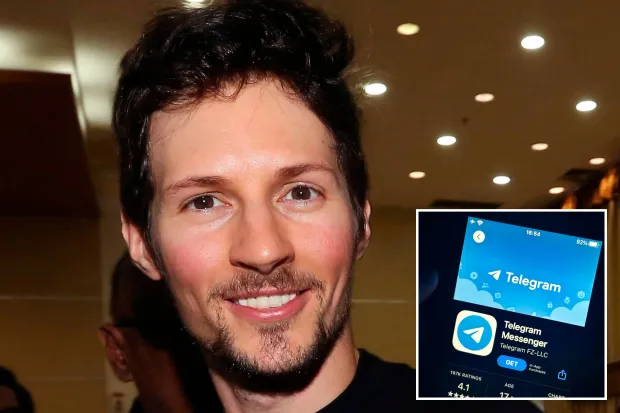Since leaving Russia in 2014, Durov has been living in self-imposed exile
Agency Report

THE founder and CEO of Telegram has been arrested at an airport in France, reports say.
Cops reportedly detained billionaire Pavel Durov as he stepped off from his private jet following his arrival from Azerbaijan.
Durov was arrested at around 8pm on Saturday at Le Bourget airport, in the outskirts of Paris, by gendarmes from the GTA (Air Transport Gendarmerie).
The 39-year-old Franco-Russian was accompanied by his bodyguard and a woman, French outlet TF1 Info reported.
Durov had arrived straight from Azerbaijan, according to a wanted persons file on him.
The Telegram founder had a search warrant above his head issued by French officials on the basis of a preliminary investigation.
Authorities claim that Telegram’s lack of moderation, collaboration with law enforcement, and the instruments it provides (disposable numbers, and cryptocurrency) make it an accomplice in drug trafficking, paedophilia, and fraud.
But the search warrant would only be valid if Durov was on national territory.
The tech mogul had been travelling to the Emirates, former Soviet Union countries, and South America as he is a persona non grata in France.
He very rarely travelled in Europe and avoided places where Telegram is being monitored.
Investigators of France’s National Anti-Fraud Office linked to the Customs Directorate notified him and took him into police custody.
Durov should appear before an investigative judge tonight before being indicted on Sunday for an array of offences, TF1 Info reports.
These could include terrorism, narcotics, complicity, fraud, money laundering, receiving stolen goods, and pedocriminal content.
Pavel Durov is a Russian-born entrepreneur and programmer best known for founding the social networking site VK (VKontakte) and the messaging app Telegram.
Born on October 10, 1984, in Leningrad (now Saint Petersburg), Russia, Durov is often referred to as the “Russian Mark Zuckerberg” due to the similarities between VK and Facebook.
In 2006, Durov, along with his older brother Nikolai, launched VKontakte, which quickly became Russia‘s most popular social network.
But his time at VK was not without controversy as Durov clashed with Russian authorities over demands to censor content and provide user data to the government.
In 2014, under increasing pressure, Durov was forced to sell his stake in VK and left the company.
After leaving VK, Durov focused on Telegram, a cloud-based messaging app that he and his brother Nikolai had launched in 2013.
Telegram became widely known for its strong emphasis on privacy and security, offering end-to-end encrypted messaging, channels for broadcasting to large audiences, and features including self-destructing messages.
Telegram’s commitment to privacy has made it popular with users around the world, but it has also attracted criticism from governments, which claim that the app is used by criminals and terrorists to communicate without detection.
LIVING IN EXILE
Pavel Durov has been in self-imposed exile primarily because of his conflicts with the Russian government over issues related to censorship, privacy, and political freedom.
The main reason for Durov’s exile stems from his time as the CEO of VKontakte (VK), the social media platform he founded.
During the 2011-2012 anti-Putin protests, Russian authorities demanded that Durov hand over the personal data of protest organizers and shut down opposition groups on VK.
Durov refused to comply with these demands, which put him on a collision course with the Russian government.
In 2014, Durov was again pressured by Russian authorities, this time over his refusal to block a VK group that supported the Ukrainian Euromaidan protests and his refusal to hand over the data of Ukrainian users to the FSB (Federal Security Service).
Following these incidents, he faced legal challenges, and his control over VK was weakened.
In April 2014, Durov was forced to resign as CEO of VK, and soon after, he sold his remaining shares in the company.
This resignation and sale were likely not voluntary but a result of immense pressure from Russian authorities and possibly from business interests close to the Kremlin.
After losing control of VK, Durov decided to leave Russia, stating that the country was “incompatible with internet business at the moment.”
Since leaving Russia in 2014, Durov has lived in self-imposed exile.
He became a citizen of Saint Kitts and Nevis through an economic citizenship program and has lived in various countries, adopting a nomadic lifestyle.
Durov continued to advocate for privacy, freedom of speech, and resistance to government surveillance—principles that are often at odds with the policies of the Russian government.
